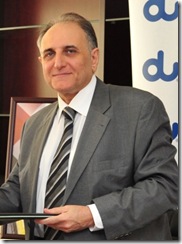Integrated UAE operator Du plans to invest AED 2.2 billion (US$600 million) on network infrastructure in the upcoming year, on the back of surging profits for the full year 2009. Revenues grew by 35 per cent to reach AED 5,339 million, compared to AED 3,951 million for 2008, while net profits before royalty reached AED 528 million, an exponential increase from AED 8 million a year earlier.
 Du’s CEO Osman Sultan said the company offers the most technically advanced fixed telephony, broadband and IPTV in the Arab world
Du’s CEO Osman Sultan said the company offers the most technically advanced fixed telephony, broadband and IPTV in the Arab world
Du’s mobile subscriber base reached 4,488,200 active mobile customers as of the end-December, an increase of 41 per cent year-on-year from a previous figure of 3,477,000. Fixed line subscribers also saw significant growth with a rise of 45 per cent to 405,900 lines. EBITDA for the full year jumped 189 per cent from AED 369 million in 2008 to AED 1,064 million.
“Three years exactly after launching our services, we have reasons to be proud of our achievements so far. Our position in the mobile market is a strong one and we have realised our ambition, in a short time, of becoming a serious player in the UAE. Our value proposition in fixed telephony, broadband Internet and IPTV is the most developed, integrated and technically advanced in the Arab world,” stated chief executive officer Osman Sultan. “We see good growth prospects ahead by widening our appeal to more and more customers through the expansion of our offering nationwide via an infrastructure sharing agreement.”
“In addition we have been building the foundations for the company to enter efficiently, through partnerships and joint ventures, into the fast growing universe of digital content and the Internet, allowing progressive ramp up of new revenue streams in the years to come,” Sultan added.
Capital expenditure for the year surpassed AED 2.4 billion, including the addition of 717 2G sites extending coverage to 99 per cent of the Emirates’ population, along with an additional 786 3G sites, reaching population coverage of more than 80 per cent.
During the fourth quarter, the company added 337,900 mobile subscribers, with revenues reaching AED 1,530 million, a 25 per cent increase from the same quarter a year earlier. Net profit before royalty witnessed 155 per cent year-on-year growth to reach AED 209 million for the quarter, up from AED 82 million in Q408.




